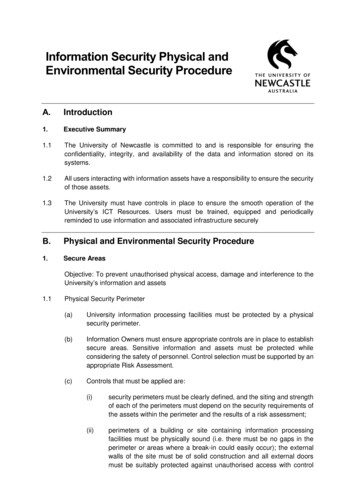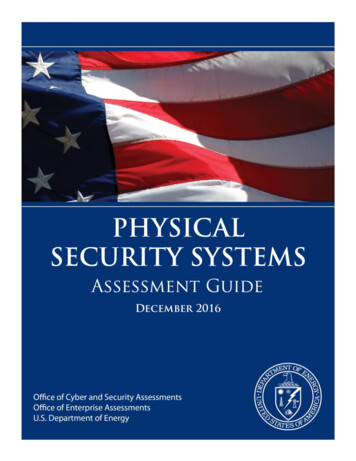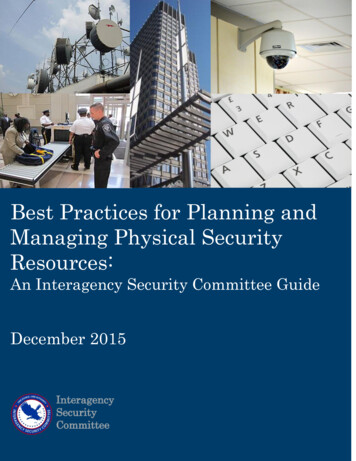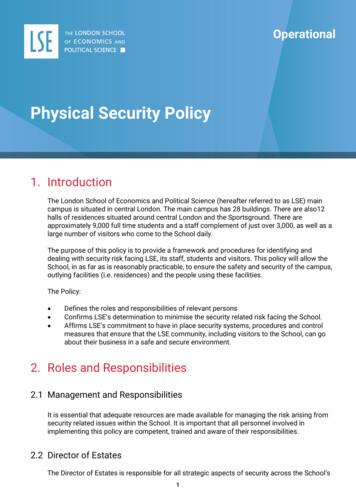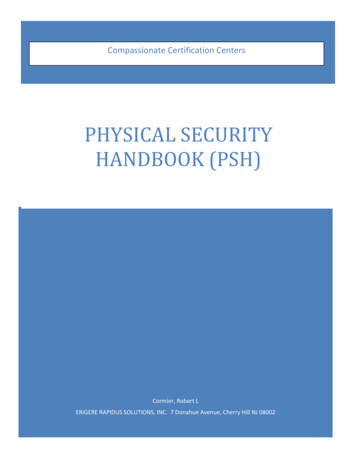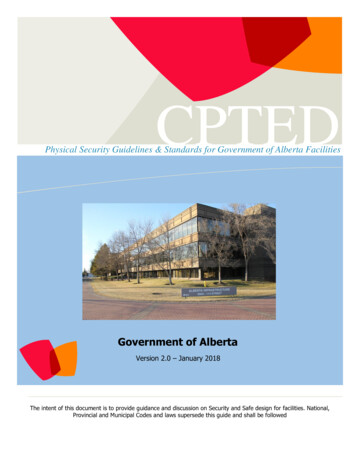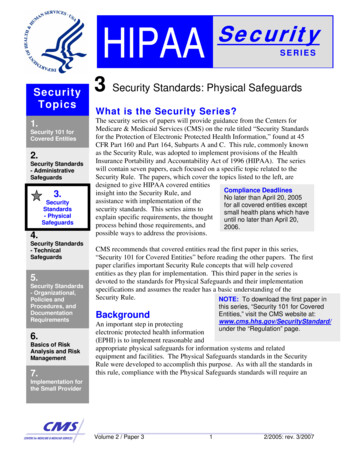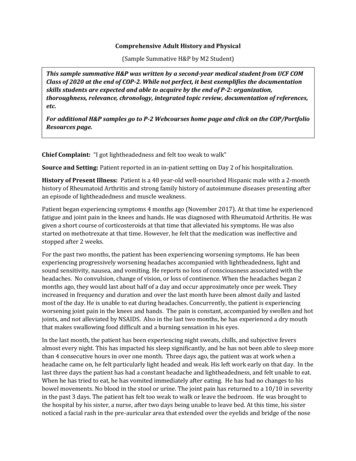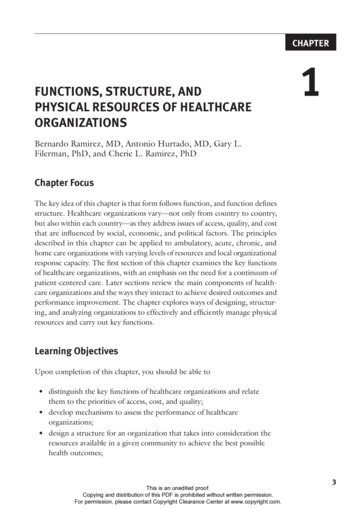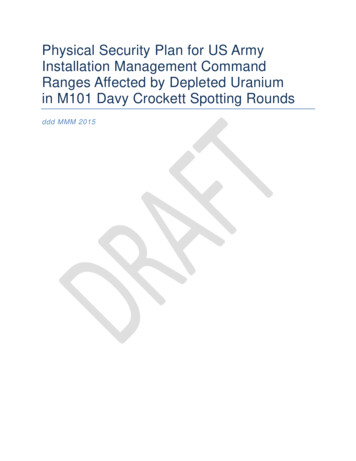
Transcription
Physical Security Plan for US ArmyInstallation Management CommandRanges Affected by Depleted Uraniumin M101 Davy Crockett Spotting Roundsddd MMM 2015
ContentsAbbreviations and Acronyms .ii1 Introduction . 1-11.1 Background . 1-11.2 Purpose . 1-21.3 Scope . 1-21.4 Applicability . 1-21.5 The Unexpected and the Unanticipated. 1-22 Physical Security Organization and Responsibilities for M101 Spotting Round DU . 2-12.1 US Army Installation Management Command (IMCOM) Commander. 2-12.2 US Army Garrison Fort Knox Commander . 2-12.3 License Radiation Safety Officer . 2-12.4 US Army Garrison Fort Knox RSO . 2-32.5 Personnel in the RCA . 2-32.6 Visitors . 2-33 Radiation Controlled Areas . 3-14 Posting Requirements . 4-15 Access Control . 5-15.1 General . 5-15.2 Fort Knox . Error! Bookmark not defined.5.2.1 Training Areas and Range Facilities . 5-15.2.2 Impact Areas . 5-15.3 RCAs . 5-16 Markings on Containers and Equipment . 6-17 Radioactive Waste . 7-18 Program Audits . 8-19 Training . 9-1
Abbreviations and ORSPUXO235uranium-234uranium-235uranium-238Archive Search ReportCode of Federal RegulationsDepartment of Defensedepleted uraniumexplosive ordnance disposalUS Army Installation Management CommandkilometermeterUS Nuclear Regulatory CommissionPhysical Security PlanRadiation Controlled AreaRadiation Safety OfficerRadiation Safety Planunexploded ordnanceii
1 IntroductionThis Physical Security Plan (PSP) is applicable at US Army Installation ManagementCommand (IMCOM) ranges that may have been affected by Davy Crockett M101spotting rounds. The M101 spotting round contains depleted uranium (DU). Theaffected areas are controlled for radiation safety purposes and are radiation controlledareas (RCAs).The License Radiation Safety Officer (RSO) will review this PSP annually and update itas necessary. If any updates to this PSP represent a significant change in approach tophysical security, then the License RSO will inform the US Nuclear RegulatoryCommission of the update.1.1 BackgroundDepleted uranium is a byproduct of uranium enrichment, part of the process ofmanufacturing fuel for nuclear power plants. When uranium is enriched in the fissile1uranium-235 (235U) isotope, the leftover uranium is depleted in 235U.2 DU is useful incertain commercial and military applications because of its high density, which is abouttwice the density of lead. It is slightly radioactive, but it poses some chemical toxicitydanger to the kidneys if ingested in sufficient quantities, for example, by inhaling DUladen dust or drinking DU-contaminated water.The M101 spotting round was a 20-millimeter low-speed projectile, weighingapproximately one pound that the Army used as part of the M28 Davy Crockett weaponsystem from 1960 to 1968. The M28 Davy Crockett weapon system was classified tosome extent in the 1960s, and records of its use were guarded.In 2005, the Army discovered tail assemblies from the M101 spotting round duringrange clearance before construction of a Battle Area Complex at the Schofield Barrackstarget impact area in Hawaii. The Army then began investigating various sites wherethe M101 spotting round may have been used. Characterization studies havedetermined that NRC-licensable quantities of DU in the form of M101 fragments exist atseveral IMCOM sites.31A fissile nuclide is a nuclide that is capable of undergoing fission after capturing low-energy thermal(slow) neutrons. This definition excludes natural uranium and DU that have not been irradiated or haveonly been irradiated in thermal reactors.2Uranium-234 (not fissile.234U) is enriched or depleted as well in enriched uranium and DU, respectively, but it is3These sites are Schofield Barracks/Pohakuloa Training Area HI, Fort Knox KY, Joint Base LewisMcChord/Yakima Training Center WA, Fort Riley KS, Fort Polk LA, Fort Benning GA, Fort Campbell KY,Fort Bragg NC, Fort Carson CO, Fort Gordon GA, Fort Hood TX, Fort Hunter Liggett CA, Fort JacksonSC, and Fort Sill OK.1-1
Physical Security Plan for US Army Installation Management Command RangesAffected by Depleted Uranium in M101 Davy Crockett Spotting Rounds1.2 PurposeThe purpose of this PSP is to address physical security issues involving M101 spottinground DU in RCAs on IMCOM Ranges. The goals are to protect the health and safetyof Army personnel and of members of the public; maintain security of licensed material(DU); and meet all applicable Federal, Department of Defense, and Army regulations.1.3 ScopeThis PSP defines the roles and responsibilities of supporting physical security staff, andexplains the physical security controls for M101 spotting round DU on IMCOM Ranges.1.4 ApplicabilityThe requirements of this plan are applicable to all personnel, including members of thepublic, who may seek access to an RCA.Requirements of this plan are in addition to, not in lieu of, any and all other physicalsecurity requirements, especially those related to unexploded ordnance in or aroundRCAs.1.5 The Unexpected and the UnanticipatedWhile all physical security contingencies are intended to be addressed by this plan,something unexpected or unanticipated may arise. If this occurs, the Garrison RSO willpromptly establish appropriate procedures and then inform the License RSO. Theseprocedures will be documented by including them in this plan or as an addendum to it.1-2
2 Physical Security Organization and Responsibilities forM101 Spotting Round DU2.1 US Army Installation Management Command (IMCOM)CommanderRegarding M101 spotting round DU on IMCOM ranges, the IMCOM Commander isresponsible for: Physical security and control of M101 spotting round DUCompleteness and accuracy of the physical security records and all informationprovided to the NRCKnowledge about the contents of the license and applicationCompliance with current NRC regulations and the licensee’s operating andemergency proceduresCommitment to provide adequate resources (including space, equipment,personnel, time, and, if needed, contractors) to the physical security program tomaintain security of DUSelection and assignment of a qualified individual to serve as the License RSOwith responsibility for the overall physical security programProhibition against discrimination of employees engaged in protected activities2.2 Garrison CommanderRegarding M101 spotting round DU on IMCOM ranges, each Garrison Commander isresponsible to the IMCOM Commander for assuring compliance with requirements ofNRC regulations and license conditions (including this PSP) on his or her installation.The Garrison Commander will select and assign a qualified individual to serve as theGarrison RSO with responsibility to the License RSO for Garrison compliance with NRCregulations and license conditions regarding M101 spotting round DU on installationranges, including physical security of that DU.2.3 License Radiation Safety OfficerThe License RSO is responsible to the IMCOM Commander for the development,implementation, and overall administration of this PSP. He is also responsible to boththe IMCOM Commander and the NRC for assuring and monitoring compliance withNRC regulations and license conditions for M101 spotting round DU on IMCOMRanges.2-1
Physical Security Plan for US Army Installation Management Command RangesAffected by Depleted Uranium in M101 Davy Crockett Spotting RoundsThe License RSO has authority to: Directly contact personnel of IMCOM Headquarters, IMCOM Regions, IMCOMgarrisons, and the Army Environmental Command (AEC) in the performance ofthe License RSO duties4Task personnel of IMCOM Headquarters, IMCOM Regions, IMCOM garrisons,and the Army Environmental Command (AEC) within their capabilities andresources in order to maintain compliance with NRC regulations and licenseconditions4Regarding physical security of DU, the License RSO will: Coordinate with appropriate personnel as necessary to assure compliance withthe requirements of this PSPEnsure security of radioactive materialAct as liaison with NRC and other regulatory authoritiesProvide necessary information on all aspects of physical security to personnel atall levels of responsibility, pursuant to Title 10, Code of Federal Regulations(CFR), Parts 19 and 20, and any other applicable regulationsConduct training programs and otherwise instruct personnel in the properproceduresOversee the storage of radioactive wasteMaintain an inventory of all radioisotopes possessed under the licenseMaintain other records not specifically designated above, for example, records ofreceipts, transfers, and surveys as required by 10 CFR 20, Subpart L, “Records”Hold periodic meetings with, and provide reports to, licensee managementPerform periodic audits of the physical security program to ensure that thelicensee is complying with all applicable NRC regulations and the terms andconditions of the licenseEnsure that the results of audits, identification of deficiencies, andrecommendations for change are documented (and maintained for at least 3years) and provided to management for review; ensure that prompt action istaken to correct deficienciesEnsure that the audit results and corrective actions are communicated to allaffected personnelMaintain understanding of and up-to-date copies of NRC regulations, the license,revised licensee procedures, and ensure that the license is amended wheneverthere are changes in licensed activities, responsible individuals, or information orcommitments provided to NRC during the licensing process.4HQ IMCOM Operations Order 11-302, Delegation of Authority to Nuclear Regulatory Commission (NRC)License Radiation Safety Officer (RSO) (U), 132138Z Apr 112-2
Physical Security Plan for US Army Installation Management Command RangesAffected by Depleted Uranium in M101 Davy Crockett Spotting Rounds2.4 US Army Garrison RSOThe Garrison RSO represents both the Garrison Commander and the License RSO inthe day-to-day physical security operations and oversight during routine range activities.The Garrison RSO will maintain records of physical security activities in the RCAs readyfor review at any time by the License RSO and by NRC inspectors.The Garrison RSO, as necessary, will: On behalf of the Garrison Commander and License RSO, assure implementationof and compliance with this PSP and applicable NRC regulations and licenseconditionsDiscuss deviations from routine range activities that affect physical security withappropriate garrison personnel and the License RSORoutinely report on physical security activities at Garrison Radiation SafetyCommittee meetings (with appropriate documentation in the minutes of thesemeetings)Perform audits as necessary to verify compliance with provisions of this PSP andof NRC regulations and license conditionsAdvise personnel as they carry out their physical security responsibilitiesEnsure appropriate physical security training is provided to appropriate personneland maintain documentation of this training2.5 Personnel in the RCAPersonnel entering the RCA will receive physical security and DU awareness training(essentially on provisions of this PSP applicable to them) from the Garrison RSO at alevel commensurate with their activities in the RCA as the Garrison RSO determinesand documents.Each person who enters the RCA is responsible for strict adherence to physical securityrules and regulations.2.6 VisitorsAll visitors to the RCA are required to comply with the requirements of this PSP.The Garrison RSO or his or her designee will brief authorized visitors requiring entry tothe RCA on the presence of DU in the RCA. Visitors will be escorted at all times in theRCA.Unauthorized visitors, and visitors not meeting the specified qualifications, will not bepermitted within the RCA.2-3
Physical Security Plan for US Army Installation Management Command Ranges Affected by Depleted Uranium in M101 Davy Crockett Spotting Rounds 1-2 1.2 Purpose The purpose of this PSP is to address physical security issues involving M101 spotting round DU in RCAs on IMCOM Ranges. The goals are to protect the health and safety
